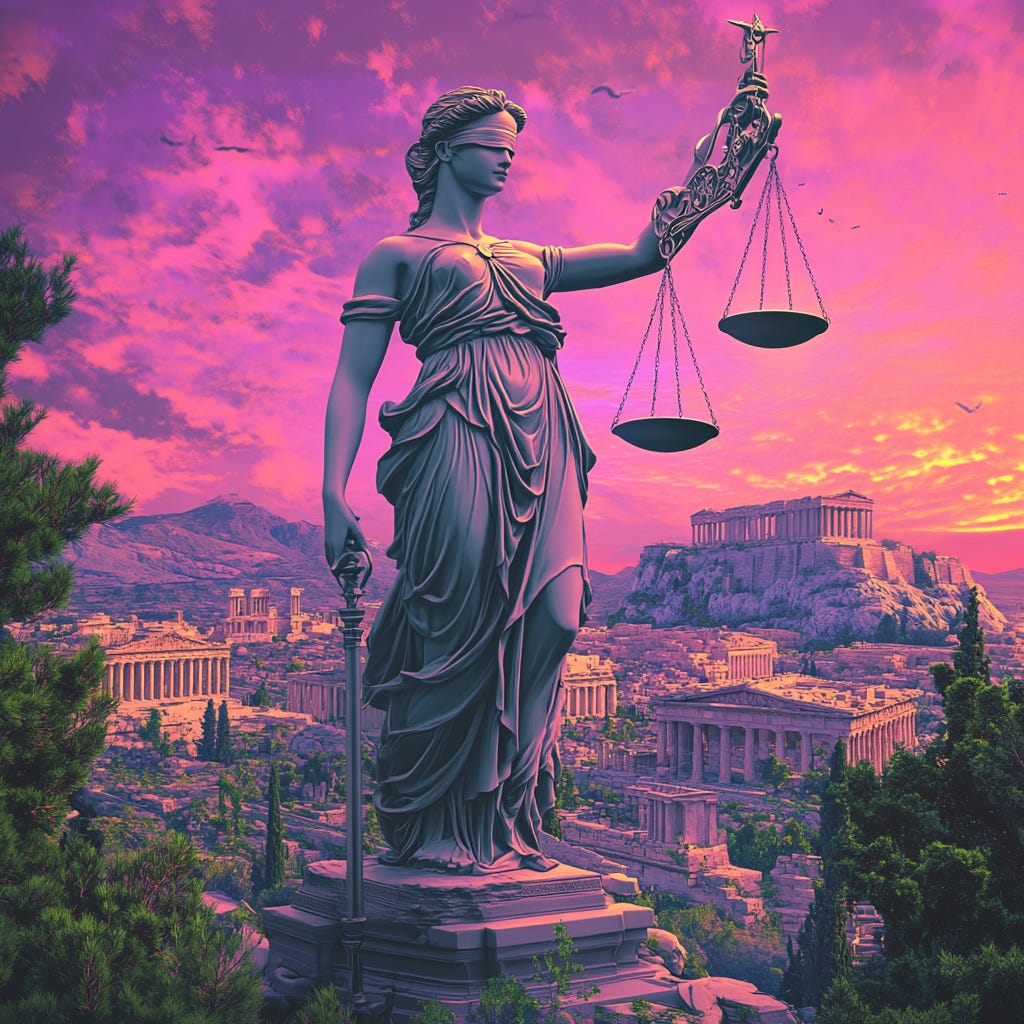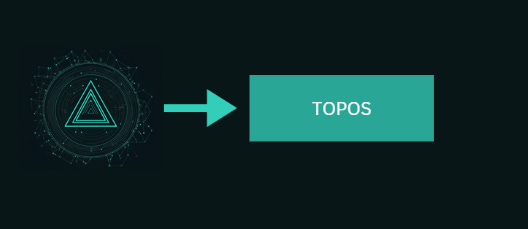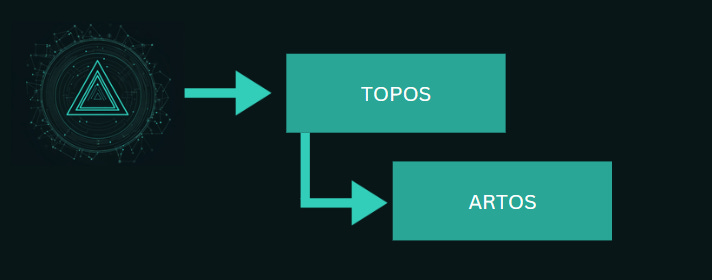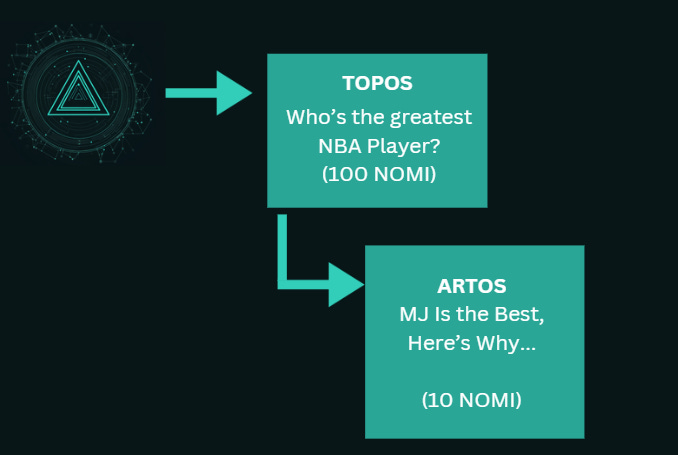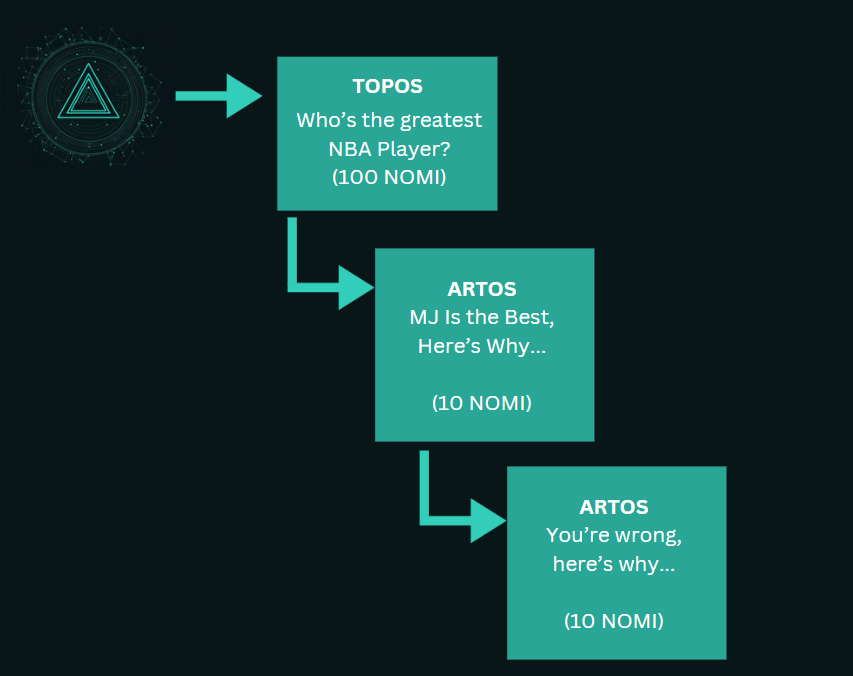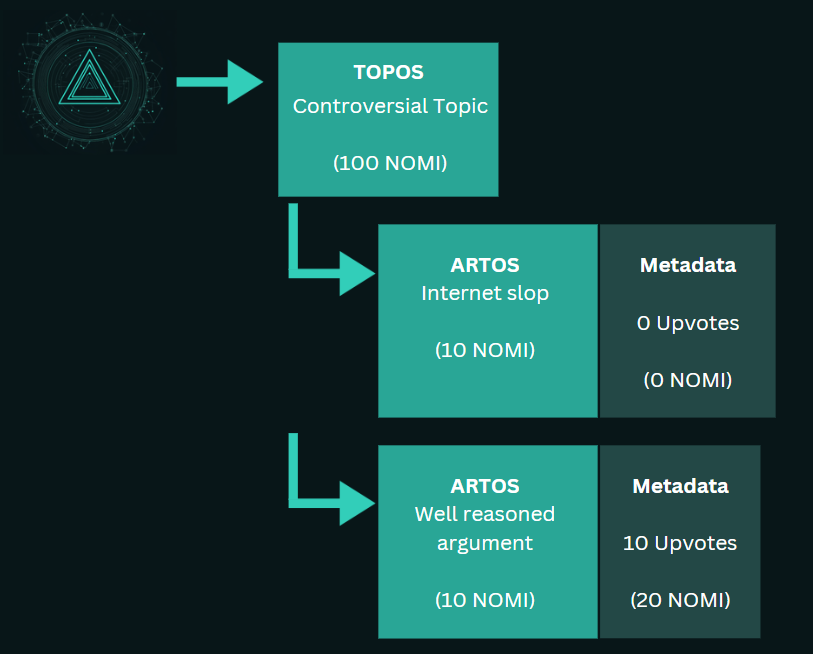Oddball Ventures: The Aletheia Network
Fix the internet and monetize the psyops.
Oddball Ventures is a series of business ideas that sound great on paper, but could just as easily crash and burn. I’m making them public so that if someone is crazy enough to run with it, maybe they throw some project equity my way.
When I got access to the internet as a kid, one of the first thing I did was access the Prodigy message boards and talk about how Power Rangers was a terrible show.
I’ve been arguing on the Internet my entire life.
And it’s growing old.
Internet debates have undergone a natural selection to the point where there is a fixed metastructure, and the parties leave the argument not having changed any minds.
You get bad faith assumptions, the “motte and bailey,” ad hominems…
And with most debates, they are simply rehashed and repeated with different parties.
It’s a repeating process with a deeply negative utility.
Yet “good” debate is important. When you’re in the Agora, it’s not that you are trying to convince your opponent; it’s the audience that matters.
That has value, and there’s a way to monetize it.
Consider this a “proto-whitepaper” for a protocol that could change the nature of how we use the internet.
What Makes a Good Debate?
With cable news and social media, time is the primary constraint. You want to get your hot takes out quick before the audience loses interest or a commercial break hits. Everyone has a short memory and the most proficient operators in that space know how to drop tactical mimetic nukes without allowing their opponent to respond.
Podcasts have provided a better structure, where a long duration of debate can help carve out the boundaries of what people are actually trying to get across. It can also reveal how “naked” a commentator is when they have to defend their positions for longer than 90 seconds.
There are more traditional debates, like the OxfordUnion or Intelligence Squared. These have very specific structures that allow for each participant to get their point across. Some of these debates get clipped and go viral, which creates a feedback loop for the longer debate.
It was those same structures that changed the U.S. election. CNN made a decision to mute microphones to prevent each candidate from interrupting, and it revealed the truth of what was going on with President Biden and his mental faculties.
Current internet debates are optimized for toxic metastructures, without any kind of “memory” so people stop rehashing the same arguments.
There has been a few attempts to fix this. You now have “fact checkers,” run by private institutions, who try to adjudicate claims that show up in the media and… well, who are we kidding. They’re partisan hacks that are there to control narrative.
A good debate network consists of three things:
No time constraint
A structure that incentivizes good debate
Don’t repeat the same arguments
A solution now exists to setup a truly neutral debate platform. And maybe cash in along the way.
Introducing the Aletheia Network
Aletheia is a Greek word that means “truth” or “disclosure.”
For now, it’s the placeholder name for this project. I even had Midjourney make a cool logo:
It’s a protocol that could be built using the Ethereum network. The protocol would be completely content-neutral, but it would require a fee to add to the blockchain.
Because crypto project naming conventions are required to be insufferable, we will keep with Greek words.
There are two primary pieces of data. The first is “topos,” which is the topic that’s for discussion.
For our example, we will use this as our Topic:
“Who is the Greatest NBA Player of All Time?”
Underneath the topos, you have “artos,” which is bread. These are like breadcrumbs, a way to track the debate.
We’re going to introduce some very rough tokenomics here, using back-of-the-envelope calculations. The actual numbers could be optimized to maximize network value.
Our token is going to be called “Nomi,” which is short for the word “nomisma,” a Greek word for a store of value. I told you it would be insufferable!
Topos data could be generated a few ways. The first would be in a form of governance, where the Nomi holders would vote on what Topos to add to the blockchain.
The other way would be to spend Nomi to add it to the blockchain. Let’s say the cost of a Topos is 100 Nomi.
Let’s go back to our Topos of who’s the best basketball player, and you thought it’s Michael Jordan.
So you create an “artos,” the first breadcrumb in the debate. You create a work of art, explaining the history of the league, how Jordan redefined the game, all his statistics and championships, and put it into the blockchain.
If you wanted to argue sports on twitter, this wouldn’t cost anything but your time.
But if you want to add it to the blockchain, you’re going to spend some Nomi. For our argument, say it’s 10 Nomi.
This restricts people from shitposting. It doesn’t stop it, but it adds a financial obstacle to drastically increase the signal to noise ratio.
Now we have a Topos and its first Artos. If another user wants to debate the point, they can “reply” with another Artos nested underneath it.
Or if they wanted to argue a different point, like how Lebron is better (lol no), then they could create an Artos at the top level.
Either way, they’ve gotta pay up.
Better Debate Network Incentives
With tokenomics, the stick can also be the carrot. Or bread, in this case.
You’ve now got a Topos with multiple Artos underneath each. Some of the debate points are well reasoned; others are the stupidest slop that you would expect from the Internet.
You now have other network participants that can evaluate each argument. If they think one argument is better than the other, then they can upvote an Artos.
The cost for this upvote is 2 Nomi. 1 of the Nomi goes to the protocol to be burned or stored in the Treasury, and 1 of the Nomi goes to the author of the post.
This is how you can incentivize good arguments on the internet. The token is a finite resource so people have to allocate. They’re not going to spend it on a “repost.”
Do you see how the economics work?
Users can risk some Nomi and provide a very good argument. If they have 10 people upvote their Artos, then they’ve covered the cost and could potentially turn a profit from arguing.
(I’ve wondered if adding a “downvote” would work as well. I’d say you would want a downvote to cost significantly more, but there could be some meta-signalling in the most controversial posts and may have a use case.)
Network Advantages
Anonymity is Available But Not Required
There are some debates where you can have very good points, but you don’t want to reveal yourself. It could be due to the argument existing well outside the Overton Window, or perhaps you have data that you want to disclose but you can’t afford the professional risk.
You could also have public or pseudonymous accounts that become mini-celebrities. Subject matter expertise isn’t a requirement if the arguments are weighed using a market function, but I’m sure some people could get additional leverage to their arguments if they could share it with their current audience.
Anonymity Allows Whistleblowing
Our example of a sports debate is low stakes, the only risk is looking stupid.
But what if a Topos was “Who Blew Up the Nordstream Pipeline?”
That’s been debated to death on the Internet, but not a whole lot of truth has come out.
What if you were on the inside, didn’t agree with the action, and wanted to reveal what took place.
They could throw some sources up on IPFS or Filecoin, then pay for an Artos to provide evidence.
If that evidence is good, you’ll have others boosting that signal by upvoting it to the top. With enough momentum and the right economics, whistleblowing could end up being extremely lucrative.
Debate Reusability
I’m a big fan of Nuclear Power, and it’s negligent that the United States hasn’t had a rapid buildout of nuclear energy. It’s a solved problem, and the people who are against it just re-hash the same old tired arguments.
Instead of trying to create a rebuttal for their arguments, you can just link to an Artos that already tells them why they’re wrong.
This can cause a virality loop, where the social audience can go into the Aletheia Network and see the full argument. If those participants hate the points being made, then they can buy some NOMI and put their well-reasoned arguments on-chain.
This also reduces the noise on the Network. If someone has made strong points about a topic, you don’t have an incentive to add to the debate unless you think you can get a solid ROI out of it.
Untangle Complex Arguments
There’s a classic online debate technique called the “Motte and Bailey,” where you will say something outlandish on the internet, and when called out on it, you walk back your argument to something that’s more easily defensible.
When that happens, it means that the broader argument is complex and nuanced. This means arguments can go deep down some bread crumb trails until the true source of the disagreement hits. This complexity improves the network and could help debaters monetize their arguments even more.
How to Deal With the Psyops
During the second half of the 2010s, the U.S. federal government started to interfere more in the social media sphere. They could create hidden “support” tickets that could shadowban users or outright delete posts.
In the various panics in 2020, we saw the full scope of these projects. They had to cover up so much that their signalling was entirely predictable.
Social media companies were right to comply with their requests. If they didn’t, then the Feds would go looking for ways to hurt these companies. They could easily kneecap Meta with antitrust actions, so it’s easier to just go along.
If the Aletheia Network were to truly achieve scale, the network would be absolutely flooded with bad actors. You’d have trolls from the deepest parts of the internet driving up the worst answers to the top. Political networks would be activated. State intervention would show up to increase the signal of the Approved Narrative.
This is a good thing. A very good thing.
All of those actions would skyrocket the demand for the Nomi token, which would reward early adopters.
Yet it goes further than that.
Each “upvote” of an Artos would have a crypto address associated with it. If a bad actor shows up, it’s going to leave a footprint. The extreme transparency of blockchain networks allows you to “trace” where some of the bad actors are coming from.
And all of this gets fixed at the Application Layer.
Anybody can create an app on top that can put any filter they want. You’ll be able to remove the shitposters, the government actors, and the idiots.
And filtering for the noise is cheaper as there is a natural cost to add noise to the network.
Leveraging The Debates
Nomi owners could have a few other sources of revenue derived from the network.
If the data stored in the blockchain has a very high signal/noise, then it’s incredibly valuable. Think of licensing the data to a search engine, or creating your own search engine layer to monetize.
The AI play could be exceptional as well. Current LLMs require a ton of data to train on, much of which is pulled from the internet. Training LLMs also mean teaching the software how to avoid “high noise” language.
Expand the Scope to Fix Social
This isn’t just about debates. It’s how so much user generated content is held in walled gardens that did not reward the creators.
There’s been attempts— Squidoo and Mahalo rewarded users for writing blog posts to get a share of ad revenue, but that went away as Google’s ad networks matured.
And you have reddit, which is both the best and worst place on the internet. It has a ton of value in niche subreddits, but as a whole it’s been ideologically captured by a bunch of power moderators that are compensated by under the table dealings.
The Aletheia Network could become a “Proof of Truth” network, with the ability to outcompete large corporations and Nation States for control of the Narrative.
Here’s Why This is A Terrible Idea
If I’ve done a good job, you’re now “all-in” and ready to invest in a token offering.
Of course this is just a fictional network, and unless things drastically change I don’t think I would try and launch it. Here’s why:
Aggressive Network Effects Would Be Required
This is a very straightforward idea to implement, which means it could be cloned, copied, or forked at the first sign of success.
The launch of this would require involving very influential participants to come in early. My personal network would not be enough to get this going, and I don’t feel like spamming a bunch of discords for interest.
Alexis Ohanian (kn0thing) comes to mind. He cofounded reddit, and is deeply involved in crypto. He could spin up a clone overnight, promote it in his network, and I’d be left holding the bag on a bunch of tokens I just created.
Dynamic Shifts in Tokenomics Could Break The Network
There are a few issues that need to be solved before this Network could work properly:
What’s the optimum incentive structure for people to post good ideas
How would the token supply change over time given more Network participants
Who would define the Topos
The “obvious” solutions now may not work if the Network grew 100x, and that could introduce fragility in the system. I’m not competent enough in the crypto markets to figure that out.
The Feds 100% Will Come After You
Imagine that there was a Topos about the Nordstream pipeline, and a whistleblower from the DoD posts a leaked audio call between the State Department and a Ukranian wetworks team confirming the op.
The Federal Government doesn’t care about how networks and protocols work— they will still get your ass.
Just like the developers of Tornado Cash. Just like the CEO of Telegram.
I don’t want that kind of heat, or at least I don’t see how I could be compensated to justify the existential risk of becoming an adversary of various state agencies.
Still Convinced?
If you’re reading this and you still think it has legs after all the risks involved, then let me know. You’ll still need to have a ton of early movers and probably some initial capital to get the ball rolling.
Let me know if you want to give it a shot and I’ll see if I can help.


